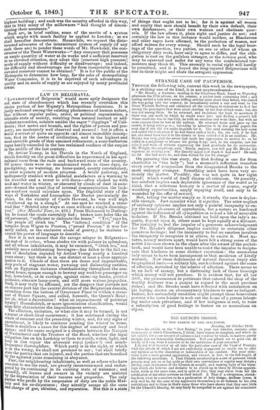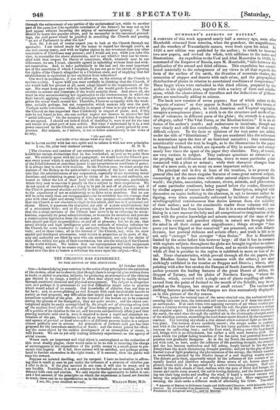THE CHURCH'S MISSION.
TO THE EDITOR OF TI1E SPECTATOR.
Monday, 1st October 1849.
SIR—An article on the "New Bishop," in your last number, contains some statements of which Churchmen, I think, have reason to complain, and which do not exhibit the saute amount of calmness and candour by which, in matters purely secular, you are honourably distinguished. Will you permit me to point out, as briefly as I can, what I conceive to be the unfairness of your remarks? I do not wish to enter at all into the particular case of the Vicar of Preston; with the details of which I am not sufficiently acquainted to enable me to offer any opinion as to the discretion or indiscretion of his conduct. But your stric- tures have a more general application, and extend, in fact, to the full length of the following assertions. 1. That Church-membership is abort of garment which persons may put on or lay aside as their own convenience or caprice may dictate; setting come ordinances of the Church at nought, and making light of the bless- ings which she believes and declares to be stored up in them by Divine appoint- ment, while at the same time, and in spite of this, they may claim from her the celebration of her other services on their behalf. 2. That if a clergyman, shrink- ing from what he conceives to be a profanation of holy things, declines (even, it may well be, for the sake of the applicants themselves) to do violence to his own convictions and to bless in God's name those who have shown that they care little for the Church's blessing, he marfahly be compelled to act against his conscience through the enforcement of one portion of the ecclesiastical law' while to another part of the same law (the equitable correlative of the former) he may not on his pert appeal without incurring the stigma of ecclesiastical tyranny. 3. That ohould he brave this popular odium, and be successful in the canonical proceed- ings, the civil power would be justified in overriding the Church and passing "an act of Parliament to alter the law."
Now, Sir, I do not of course expect you to look at the Church through my
spectacles. I am indeed ready for the nonce to regard her through youes, as one sect among many, and with no higher claims to our reverence than any other communion of Christians may possess; and I would ask you, while you take this view, to reconsider the above statements, and to say whether they can be recon- ciled with that respect for liberty of conscience, which, whatever may be our differences, we are, I trust, sincerely agreed in upholding without limit and with- out reservation. And, to refir particularly to the last and the most important use of the assertions of which I complain, do you not go to the extent of ignoring the rights of the Church altogether in a Christian state, and of implying that her establishment is equivalent to her exclusion from toleration ?
One word in conclusion, if you will allow me, on the relation of the Church to modern society. I agree with you most cordially in thinking that the Church, if she would hold her ground at all, must adapt herself to the requirements of the age. She must keep pace with its intellect, if she would guide it—with its dis- coveries in science and literature, if she would sanctify them. And above all, she must be ever accommodating her organization to the circumstances in which she finds herself, applying constantly old principles under new forms, if she is to evan- gelize the moral waste around her. Therefore, I have no sympathy with the weak- ness, amiable perhaps, but not respectable, which mourns idly over the past.
Vestiyia nulla retrorstan. Catholicity in respect of time is to my mind a note of the Church no less important than Catholicity in respect of place; and, if this note be not found in her, she can neither expect nor deserve to recover her full "social influence." On the meaning of this last expression I would fain hope that we are agreed. I should not indeed think of doubting it, were it not for the tone and tenour of a great part of your article. But what I understand by it is, a real power exercised by the Church, and not the semblance of power gained by com- promise. Her mission, as I believe, is not to follow submissively in the wake of smiety,
"idle and still, And ledde of her stew what way they will " ; but to leaven society with her own spirit and to inform it with her own principles. I am, Sir, your very obedient servant, M. D. S.
[The clearness and candour of our correspondent are a pledge that he will ac- knowledge certain distinctions that he has overlooked, as soon as we point them out. We entirely agree with his last paragraph: we would have the Church pos- sess every power which it can fairly attain, and had rather counsel the suppression of the Establishment at once than assent to any compromise or semblance of power. It is always best to deal with realities. In the Preston case, we must accept the decision of the Bishop as the authoritative expression of the law; and we main tam n that the administrators of any corporation, especially of one exercising moral functions and subsisting in great part by virtue of its own moral authority, are bound to follow the law of their body uith the utmost strictness, particularly where they seek to exercise it penally on tho_e subject to their corporation. We do not speak of membership as a thing to be put on and off at pleasure; and if the Church possessed absoleU authority-in this island, no question would arise as to the expediency of not so ministering as to drive away members. But no one will be more ready than our correepeudent—for he evidently has the courage that goes with clear sight and strong faith in his own purpose—to confront the fact, that the Church is not absolute or single in this island, still less is it so beyond our shores. Hence, it possesses the character, not only of a state establishment, but of a missionary body; and at the present day, few precisionists would maintain that the zealous servants of the Church best serve it by so enforcing its minis- trations, especially its penal administrations, as to exerce its members and provoke s counteractive legislation from the secular power. We do not say that, lay mem- bers should put their responsibilities on and off at pleasure; but we do say, that sound divinity and high intelligence point out methods of winning influence for the Church far more conducive to its authority than that kind of spiritual bra- vado; and in these times, all in the interest of the Church, nay, even its more candid and intelligent adversaries, must rejoice in proportion as its posts of dig- nity and authority are filled by men who can understand, not only the duties of their office within the pale of their communion, but also the relation of the Church to the world without. We believe that our correspondent will fully reciprocate that feeling; and we by no means regret to see that our passing remarks have in- duced men like him to bestow a reflection the more upon the subject.—En.]

























 Previous page
Previous page